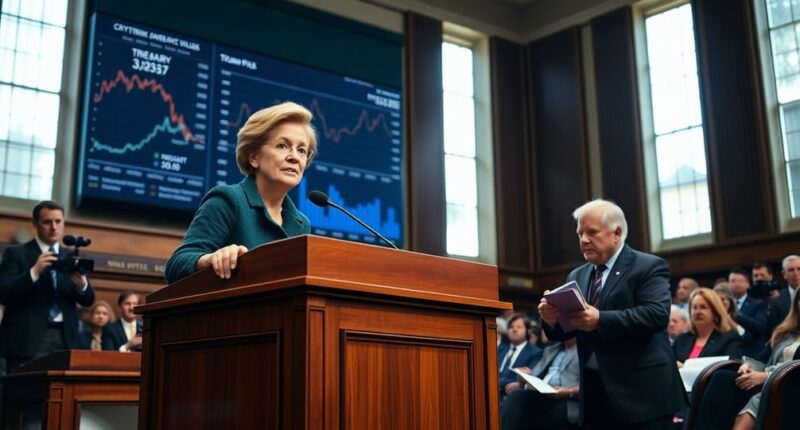Senator Warren's push for stricter crypto regulations is gaining traction, especially in light of gaps in the current framework since Trump's Treasury pick. She's highlighting the confusion between the SEC and CFTC, which allows financial criminals to exploit the system. Warren's proposal focuses on tightening anti-money laundering measures and enhancing tax reporting to close these loopholes. While there's bipartisan support for clearer regulations, some fear it might hinder innovation in the crypto space. As the Senate increases scrutiny on this issue, it's essential to stay informed about potential changes that could affect the market. More insights await you.
Key Takeaways
- Senator Warren advocates for stricter regulations to address gaps in current cryptocurrency oversight, particularly amid conflicts between the SEC and CFTC.
- The Digital Asset Anti-Money Laundering Act aims to enhance regulatory frameworks and prevent financial crimes exploiting existing ambiguities.
- Warren emphasizes the need for clear tax reporting rules to curb tax evasion in the rapidly evolving crypto market.
- The Senate is increasing scrutiny on cryptocurrencies, focusing on national security and the establishment of a structured regulatory framework.
- Concerns exist that overly stringent regulations may hinder innovation in the cryptocurrency sector, impacting its growth and adoption.
Regulatory Challenges in Cryptocurrency
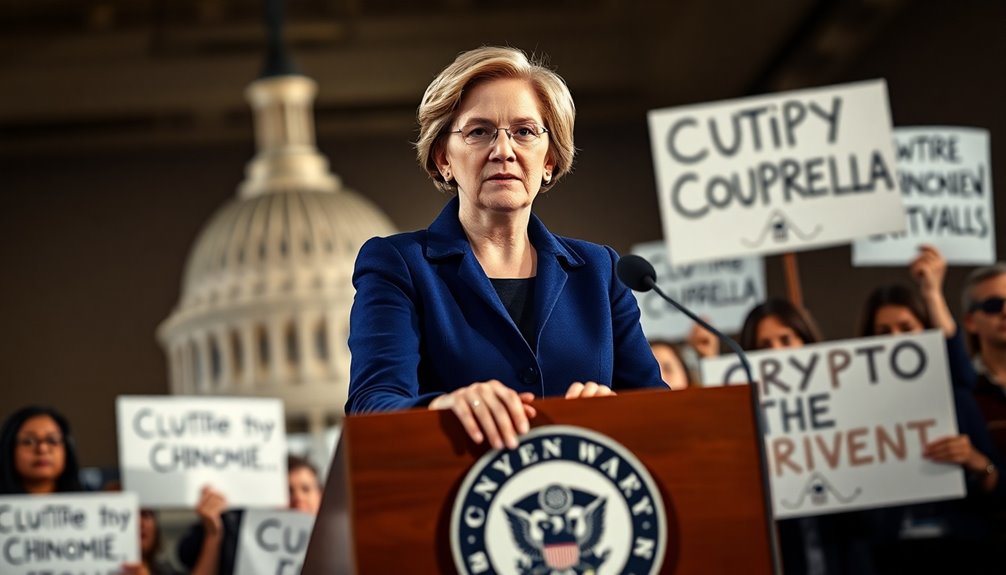
As the cryptocurrency landscape evolves, you're likely to encounter significant regulatory challenges that can complicate your understanding of the market.
You'll find that multiple regulators, both federal and state, create a fragmented framework, leading to gaps and overlaps in oversight. The classification of crypto assets as commodities or securities often sparks jurisdictional conflicts, especially between the SEC and CFTC, adding to the legal uncertainty you face. This complexity is further compounded by the rapid evolution of crypto regulations globally, with varying approaches taken by different jurisdictions.
Globally, the lack of coordinated regulations means many countries still lack clear guidelines, increasing complexity.
Additionally, the expansion of regulatory perimeters demands more stringent oversight, making it crucial for you to stay informed about these evolving rules to navigate the challenges effectively and safeguard your investments.
Warren's Regulatory Proposal Sparks Debate
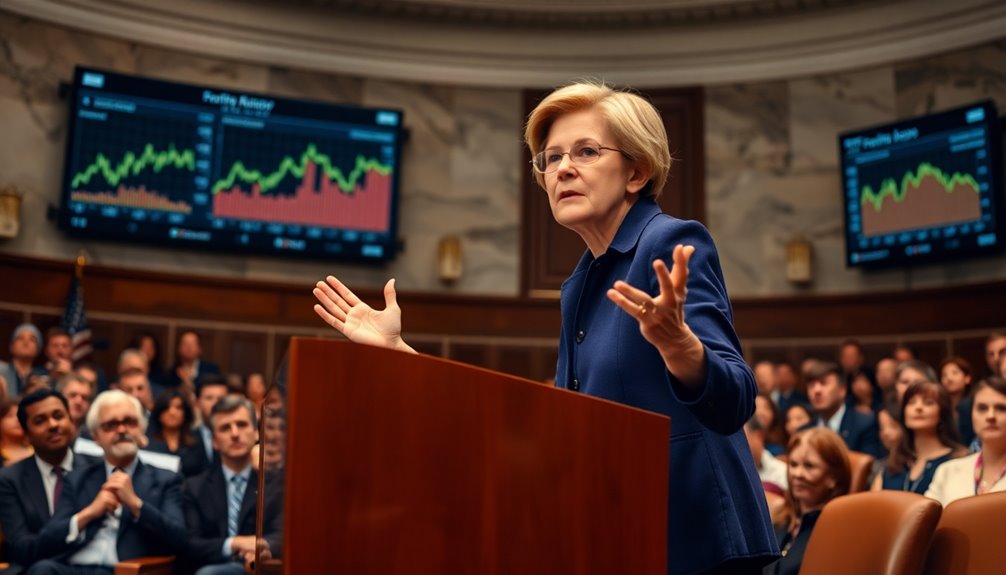
Regulatory challenges in the cryptocurrency space have intensified the debate around Senator Warren's proposals for stricter oversight.
Many argue that current regulations leave significant gaps, creating confusion between the SEC and CFTC about jurisdiction. This ambiguity allows financial criminals to exploit the system, laundering billions without the same scrutiny faced by traditional financial institutions.
Warren's push for the Digital Asset Anti-Money Laundering Act aims to close these loopholes and enhance oversight, gaining bipartisan support. Additionally, her call for clearer crypto tax reporting rules seeks to prevent tax evasion.
While some appreciate these efforts, others worry that stringent regulations could stifle innovation in the crypto market, highlighting the ongoing tension between regulation and growth. Furthermore, the need for a cohesive regulatory framework could be crucial to ensuring that oversight does not hinder the development of the industry.
Cryptocurrency Price Volatility
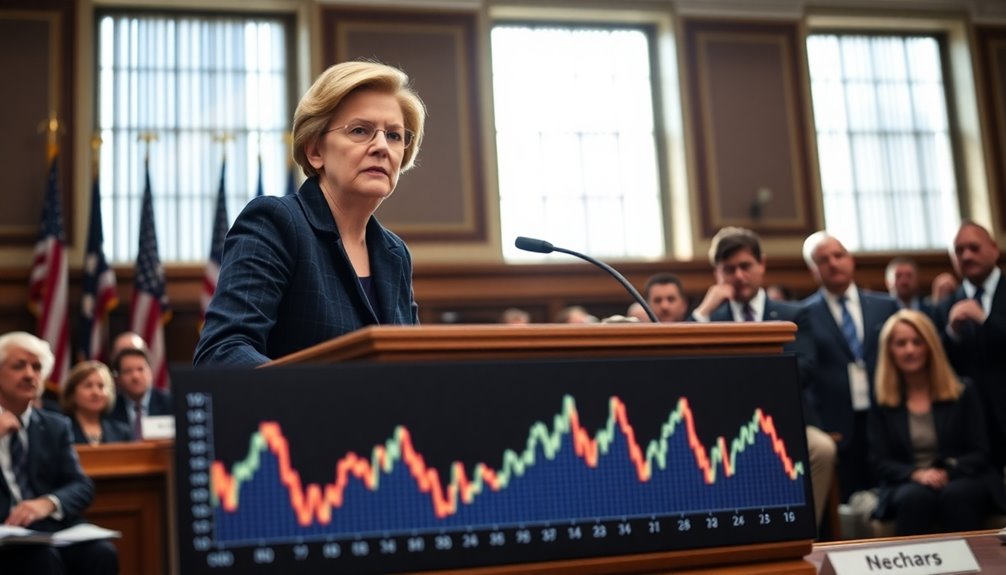
While many investors are drawn to the potential for high returns in cryptocurrencies, the market's notorious price volatility can make it a rollercoaster ride.
Market sentiment plays a crucial role; positive news can send prices soaring, while negative reports trigger swift declines. Social media amplifies this effect, often leading to herd mentality driven by fear, uncertainty, and doubt. Additionally, crypto exhibits higher volatility than traditional assets, which can further exacerbate price fluctuations. Limited supply, especially in assets like Bitcoin, combined with the influence of large-scale investors, can create sharp price swings. Additionally, security breaches can lead to panic, causing immediate sell-offs.
With liquidity issues and ongoing price discovery, it's clear that understanding these factors is essential for navigating the unpredictable crypto landscape.
Corporate Investment in Blockchain
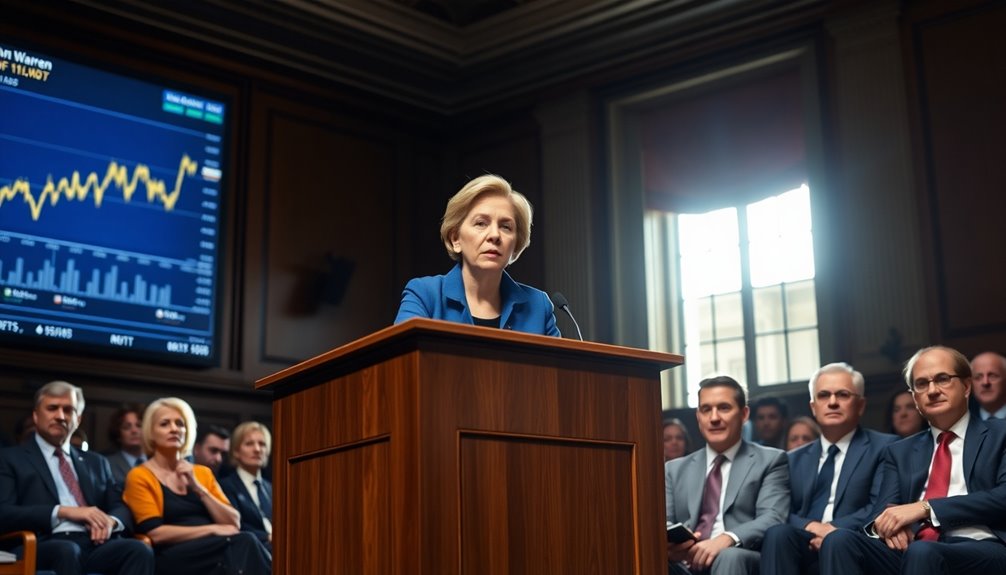
The unpredictable nature of cryptocurrency prices hasn't deterred corporations from recognizing the potential of blockchain technology. In fact, the global blockchain market was valued at USD 72 billion in 2022 and is projected to soar to nearly USD 12,895 billion by 2032. You'll find that 60% of CIOs are on the verge of implementing blockchain into their operations, with 53% of C-level executives seeing it as vital for corporate infrastructure. Industries like healthcare are rapidly adopting blockchain, with predictions that 55% of healthcare applications will be using it by 2025. The spending on blockchain solutions is expected to exceed $19 billion in 2024, showcasing a strong commitment to innovation across various sectors. Furthermore, the blockchain technology is projected to boost global GDP by $1.76 trillion by 2030.
Senate Hearings on Cryptocurrency Regulations
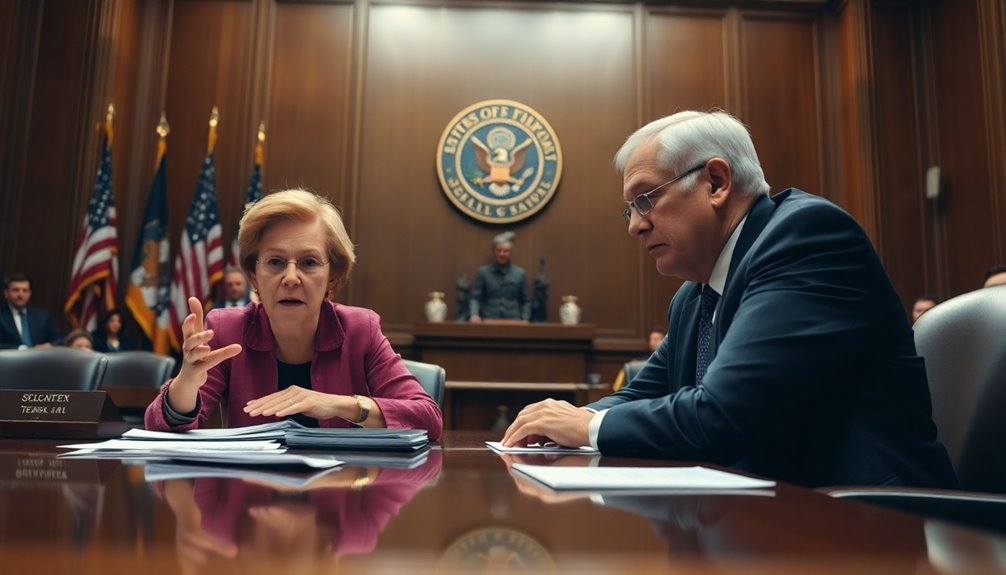
Amid growing concerns over the impact of cryptocurrencies on national security and financial integrity, the U.S. Senate is ramping up scrutiny of crypto regulations. Senator Elizabeth Warren has emphasized the threat posed by unregulated cryptocurrencies, calling for stronger anti-money laundering measures to prevent funding for rogue nations. The Senate Banking Committee is establishing a subcommittee to create a structured regulatory framework, with Senator Cynthia Lummis poised to lead it. This subcommittee will consider critical legislation like the Financial Innovation and Technology for the 21st Century Act, aiming to clarify the status of cryptocurrencies. A new crypto subcommittee will also focus on balancing industry growth with risk mitigation against volatility and security breaches. As industry reactions unfold, many see this as a step toward much-needed regulatory clarity, potentially stabilizing the market and encouraging institutional adoption.
Long-Term Regulatory Landscape Predictions
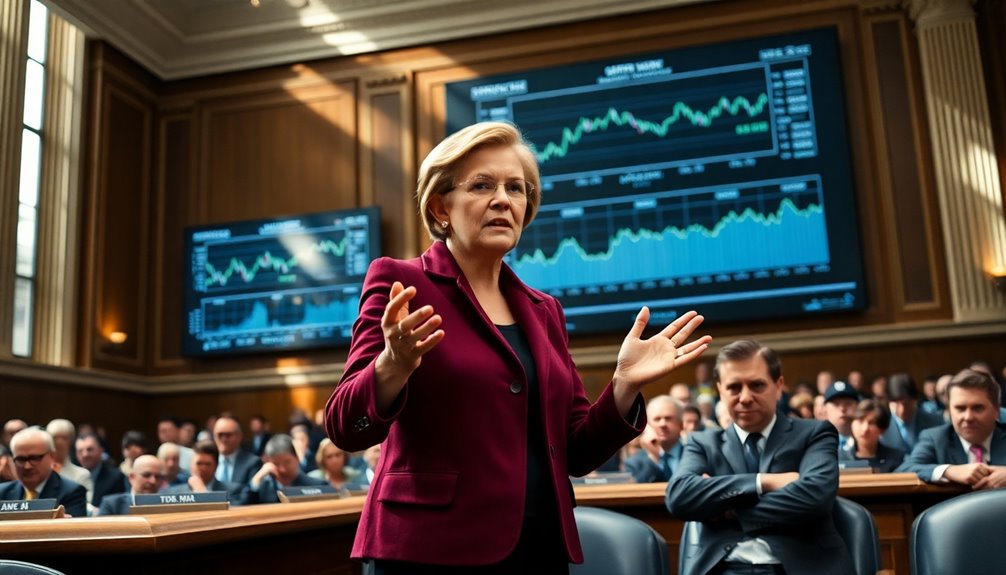
As lawmakers push for clearer regulations in the cryptocurrency space, the long-term landscape is likely to see significant shifts.
You can expect the SEC to establish clear boundaries between traditional securities and crypto assets, helping both entrepreneurs and investors navigate a complex environment. This will be crucial as the SEC uses the Howey test to determine which cryptocurrencies qualify as investment contracts.
Compliance standards will emerge, mandating registration for exchanges and tokens to ensure adherence to established financial regulations.
Enhanced market surveillance will mitigate price manipulation, fostering trust among investors.
Anti-money laundering and counterterrorism financing regulations will address public safety concerns.
Ultimately, this regulatory clarity could legitimize the crypto sector, attracting traditional investors and encouraging innovation, while also emphasizing the importance of investor education to navigate these new waters effectively.
Frequently Asked Questions
What Specific Regulations Does Senator Warren Propose for Cryptocurrencies?
Senator Warren proposes several specific regulations for cryptocurrencies.
You'll need to comply with Know-Your-Customer (KYC) requirements, report any suspicious transactions, and verify identities for large peer-to-peer transactions.
Additionally, crypto exchanges and service providers must adhere to the Bank Secrecy Act (BSA) and be classified as financial institutions.
These measures aim to combat illicit activities, including money laundering and terrorist financing, ensuring a safer digital asset environment for everyone.
How Might These Regulations Impact Everyday Cryptocurrency Users?
Stricter regulations could significantly impact your experience as an everyday cryptocurrency user.
You'll benefit from better investor protection, as enhanced oversight can reduce fraud and ensure market integrity. Transparent transactions will help you avoid hidden fees, while clear guidelines boost your confidence in the system.
Additionally, as regulatory frameworks evolve, you'll likely see improved consumer protections and a more stable market, making it easier for you to navigate the crypto landscape.
What Are the Potential Consequences for Non-Compliant Crypto Companies?
Consequences can be catastrophic for crypto companies that choose to flout the rules.
You'll face hefty fines and potential criminal charges, which could cripple your business. Customer confidence could crumble, leading to a loss of trust and clients.
Cybercriminals may target your operations, exposing sensitive data to significant security breaches.
Additionally, unexpected expenses from legal fees can drain your finances, ultimately jeopardizing your company's stability and success in the competitive crypto landscape.
How Does Senator Warren's Stance Differ From Other Lawmakers?
Senator Warren's stance on crypto regulations sharply contrasts with other lawmakers.
While many support a more hands-off approach, you'll find Warren advocating for strict oversight to combat money laundering and illicit activities.
She emphasizes the need for comprehensive regulations, highlighting national security risks and the potential for crypto to fuel crises like the fentanyl epidemic.
In contrast, some lawmakers see crypto as a transformative innovation deserving of fewer restrictions.
What Role Does the Public Play in Influencing Cryptocurrency Regulations?
Like ripples in a pond, your voice can shape the waters of cryptocurrency regulations.
You play a crucial role by staying informed and expressing your opinions through polls, letters, and town halls. Engaging with policymakers helps ensure your concerns are heard.
When you raise awareness about risks and advocate for clarity, you not only influence legislative proposals but also encourage a more responsible regulatory landscape for everyone involved in the crypto space.
Conclusion
In conclusion, as Senator Warren pushes for stricter crypto regulations, the debate surrounding this volatile market intensifies. Did you know that in 2021, Bitcoin's price fluctuated by over 300%? That kind of volatility highlights the urgent need for clear guidelines. By addressing these regulatory challenges, lawmakers can help stabilize the market and protect investors. Keeping an eye on these developments could be crucial for anyone interested in the future of cryptocurrency!
